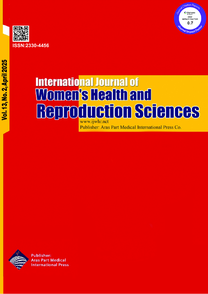| Original Article | |
| Practice and Pattern of Antenatal and Postnatal Exercise among Nigerian Women: A Cross-Sectional Study | |
| Chidozie Emmanuel Mbada1, Olubukayomi EbunOluwa Adebayo1, Taofeek Oluwole Awotidebe1, Funmilola Adenike Faremi2, Monisola Omoyemi Oginni2, Abiola Oladele Ogundele3, Anne Antonette I. Emechete1 | |
| 1Department of Medical Rehabilitation, College of Health Sciences, Obafemi Awolowo University, Ile-Ife, Nigeria 2Department of Nursing Science, College of Health Sciences, Obafemi Awolowo University, Ile-Ife, Nigeria 3Department of Physiotherapy, Obafemi Awolowo University Teaching Hospitals Complex, Ile-Ife, Nigeria |
|
|
IJWHR 2015; 3: 093-098 DOI: 10.15296/ijwhr.2015.18 Viewed : 7344 times Downloaded : 10713 times. Keywords : Exercise, Nigeria, Pregnancy, Postpartum |
|
| Full Text(PDF) | Related Articles | |
| Abstract | |
Objectives: The African culture seems to play a major prohibiting role in physical exercise during pregnancy and immediate postpartum. This study was designed to assess practice and pattern of antenatal and postnatal exercise among Nigerian women. Materials and Methods: Three hundred and sixty-five women (189 pregnant women and 179 nursing mothers) from six selected hospitals in south-west Nigeria participated in this cross-sectional study. Data were obtained on socio-demographic and obstetric characteristics, and practice of antenatal and postnatal exercise. Descriptive and inferential statistics were used to analyze data at P<0.05 alpha level. Results: The mean age of all the respondents was 28.9± 4.63 years. A majority of the pregnant women responders were nulliparous (39.2%) while the nursing mother responders were mostly multiparous (54.5%). Prevalence for engagement in physical exercise was 81.9% and mostly based on self-prescription (35.5%) and prescription by nurses (28.8%). Antenatal and postnatal exercise practice was 84.7% (160/189) and 79.0% (139/176), respectively. Aerobic (43.5%) and stretching (33.4%) were the most common type of physical exercises. Exercise frequency was mostly 1-2 times per week (40.8%). There was significant association between exercise practice and education level (?2=18.795; P=0.001). Conclusion: Engagement in antenatal and postnatal exercise among Nigerian pregnant and nursing women was high and mostly based on self-prescription. Education level significantly influence physical exercise practice among Nigerian women with aerobic and stretching as the predominant exercises in pregnancy and postpartum. |
Cite By, Google Scholar
Google Scholar
PubMed
Online Submission System
 IJWHR ENDNOTE ® Style
IJWHR ENDNOTE ® Style
 Tutorials
Tutorials
 Publication Charge
Women's Reproductive Health Research Center
About Journal
Publication Charge
Women's Reproductive Health Research Center
About Journal
Aras Part Medical International Press Editor-in-Chief
Arash Khaki
Mertihan Kurdoglu Deputy Editor
Zafer Akan























